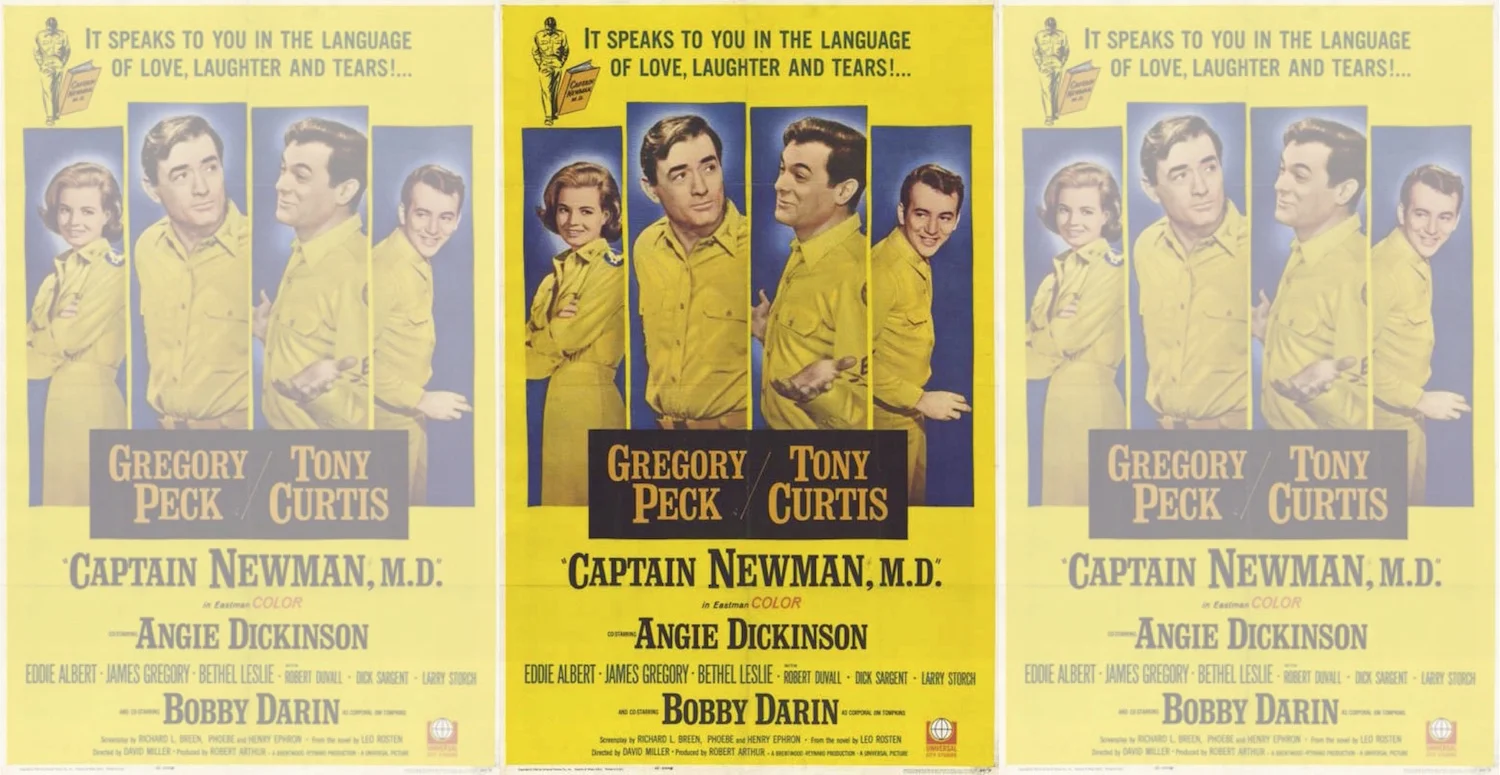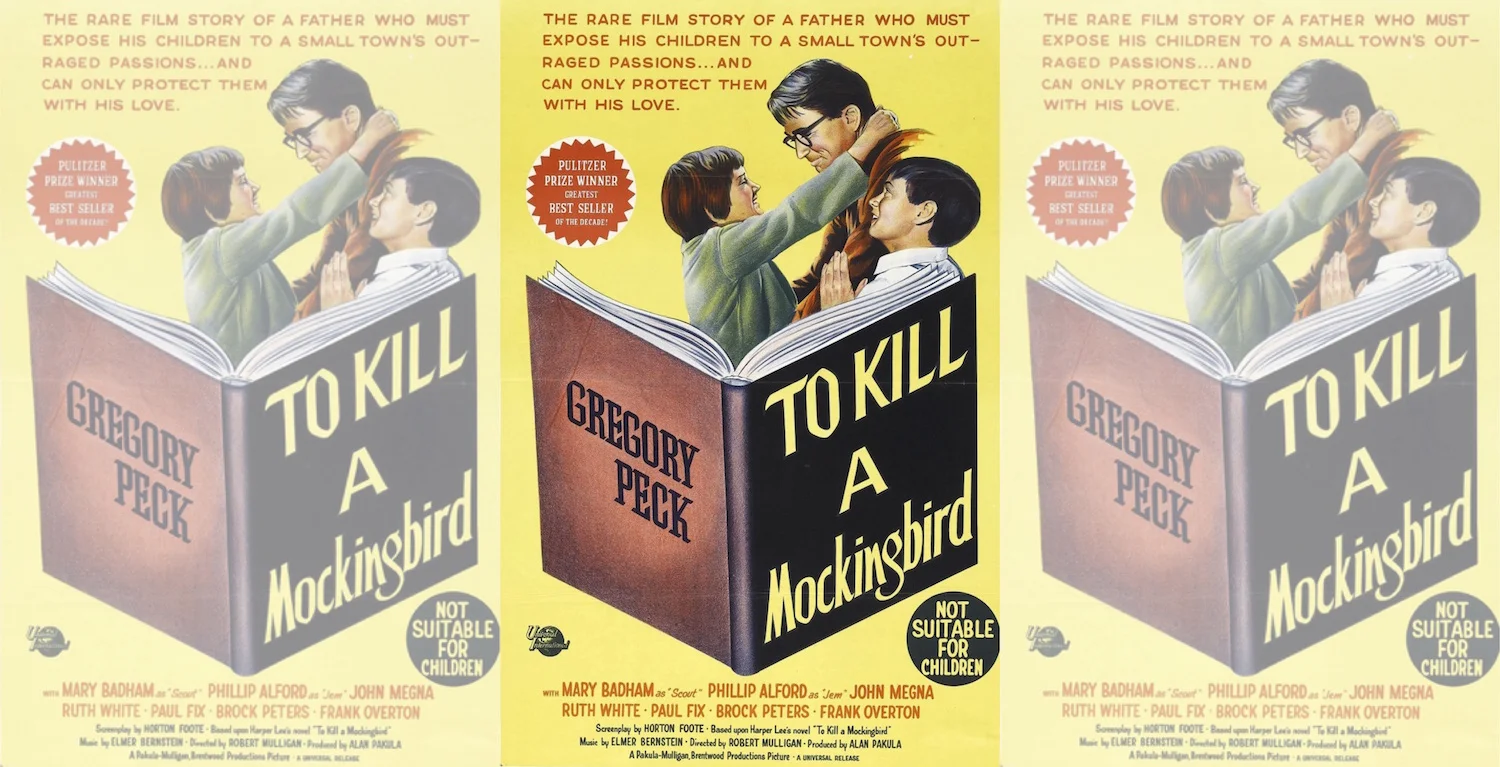Captain Newman, M.D. (1963)
ONE FLEW OVER THE CAPTAIN’S NEST
In Martin Levin’s “Reader’s Report” in the 7 January 1962 issue of The New York Times, the critic describes Leo Rosten’s 1961 novel, Captain Newman, M.D., as a “heartfelt panegyric” to those who served in World War II to help save our civilization, as well as to those Americans whose humanity makes our society actually worth preserving. Not surprisingly, those words apply just as readily to the film based on the literary source material. In the cases of some characters, the eulogistic nature of the work comes across more literally than figuratively, and therefore with even greater power.
Gregory Peck and Bobby Darin in Captain Newman, M.D.
Gregory Peck portrays the eponymous main character, an Army Medical Corps doctor overseeing the neuropsychological care of soldiers damaged enough to merit removal from active duty. Stationed stateside at the fictional Colfax Army Air Field in Arizona, Captain Newman regularly runs afoul of the base’s commanding officer, Colonel Edgar Pyser, played with an appropriately coarse and serious manner by the always-solid James Gregory. At first, the psychiatrist’s transgressions and the reactions to them are played out with an oddly light touch. Indeed, the opening scene of the film shows a jeep traveling across the base and forced to a stop by a heard of sheep in its path; a soldier in the vehicle calls out to a nurse with a complaint about Captain Newman’s wayward flock. More than just the event, the tone is broadly comic, with a musical accompaniment that borders on the whimsical.
Such humor continues intermittently throughout the film, carried along mostly by Tony Curtis and Larry Storch, both of whom play officers serving under Captain Newman in Ward 7. Mr. Curtis is particularly good in the role of Corporal Jake Leibowitz, a droll, put-upon New Yorker who can seemingly work an angle in any situation, while Mr. Storch features as Corporal Gavoni, frequently a foil for Leibowitz. The eventual internment in Ward 7 of fourteen Italian prisoners of war—none of them with psychiatric problems—defies understanding, but it introduces the instantly recognizable Vito Scotti as their leader, and the setup provides a few good laughs. The good-natured humor, though a bit dated, fundamentally works, but it contrasts markedly with the film’s otherwise serious bearing.
Tony Curtis as Corporal Jackson “Jake” Leibowitz in Captain Newman, M.D.’s Ward 7
Captain Newman, M.D. unfurls more as a number of related tales rather than as a single narrative—more a collection of short stories than a novel. The overarching framework involves the psychiatrist’s treatment of the men charged to his care, and Colonel Pyser’s dissatisfaction with the doctor because the ward over which he presides features the lowest return-to-duty rate of any in the Area Command. The CO views many of the patients in Ward 7 as “oddballs, malingerers, and yellow-bellies,” soldiers who seek time out of the war by claiming all manner of symptoms. Lamenting the high volume of psychoses, neuroses, and psychogenic syndromes that Captain Newman diagnoses, Colonel Pyser challenges him not only to speed the process of preparing Army Air Forces personnel to rejoin their squadrons, but also to avoid going out of his way to descry soldiers with potential psychological problems. Specifically, Pyser takes issue with Newman when the doctor witnesses a decorated officer, Colonel Norval Bliss, exploding at a second lieutenant simply for spilling a drink at the officers’ club; based on that and the colonel’s subsequent, oft-repeated apologies, Captain Newman regards the behavior as possibly symptomatic of mental disturbance, and so recommends him for observation in the psychiatric ward.
The diagnosis and treatment of Colonel Bliss are interspersed with the cases of two other officers, Captain Paul Winston and Corporal Jim Tompkins. Shot down over France, Winston went missing in enemy-occupied territory for thirteen months before being found in a cellar by Allied liberating forces. The flyer can identify himself, but little else; he arrives in Ward 7 in a catatonic state, marked by long periods of slumber. A gunner, Tompkins likewise survived a plane crash, but rather than attempting to rescue the pilot from the downed aircraft—which soon exploded—the corporal ran to safety, an act for which he feels profound guilt.
What seems plain to a modern audience may not have been as apparent at the time of the film’s release in 1963—and even less so to people living in 1944, the year in which Captain Newman, M.D. is set. Most of the patients passing through Ward 7 are experiencing some version of post-traumatic stress disorder, a well-recognized condition in the present medical era. In that regard, the film presented its contemporaneous audience with a new way of viewing and understanding combat-induced mental illness. World War I spawned the phrase shell shock, and WWII refashioned it as battle fatigue, but current-day perspectives on the psychological and emotional tolls of war only began to evolve in the middle of the twentieth century. Indeed, the term PTSD, now in common parlance, did not exist until 1980. It should come as little surprise, then, that Mr. Rosten based the title character of his novel on a real psychiatrist, Dr. Ralph Greenson, a captain in the Army Medical Corps who helped pioneer the association of post-traumatic stress with wartime experiences.
Gregory Peck and Eddie Albert in Captain Newman, M.D.
Eddie Albert gives a fearless performance as Colonel Bliss, who crumbles under the weight of his responsibilities, which include sending young men into battles from which they never return. The colonel’s guilt initially manifests as displaced anger, and then causes him to develop a split personality: Mr. Future and Mr. Past. The former persona comes off as loud and brash, looking only forward, while the latter bears the burdens of his erstwhile command, ultimately becoming suicidal.
Gregory Peck, Robert Duvall, and Angie Dickinson in Captain Newman, M.D.
As Captain Winston, Robert Duvall also delivers, capturing the terrible shame his character feels for having hidden behind enemy lines without ever attempting to escape. The low-energy shell he erects about his self-imposed obloquy seems impenetrable and quite believable. Bethel Leslie plays his wife with a starch befitting the character’s upper-crust sensibilities. Helene Winston’s rigid façade cannot entirely hide her love for her husband, the pain she feels for him, or her sense of helplessness in not being able to help him recover.
More than any other actor in the film, Bobby Darin stands out. Portraying Corporal Tompkins, Mr. Darin’s character starts as a hard-drinking soldier, morphs into a lost man searching desperately for help, and then turns in a long, intense revelation in an emotional scene that surely formed the basis for the Academy Award nomination he would receive. His multiple modulations never stray from the real, and he takes the audience on an affecting and impactful ride.
But while the tales of those three soldiers—Bliss, Winston, and Tompkins—are fully formed journeys, the film is strangely devoid of any substantive arc for Captain Newman. Mr. Peck plays the dedicated psychiatrist with an earnestness and compassion that transcend any of the hijinks around him—almost as Atticus Finch with a medical diploma rather than a law degree. The film sets up the character’s dilemma in the form of his commanding officer’s disapprobation, but that story line features no real payoff. Captain Newman empathizes with his patients, and he works hard to treat them, even as he wonders about the efficacy of healing young men so that they can return to war and be killed. Unlike in many films, and especially those of its era, the main character meets with both successes and failures, but there is no through line connecting where he begins to where he winds up, because he essentially remains in the same place—physically, mentally, and emotionally. Even a mild flirtation Captain Newman cultivates with Angie Dickinson’s Nurse Francie Corum, comes off as chaste, meaning that not only doesn’t the main character change, he doesn’t even get the girl.
Overall, Captain Newman, M.D. is peculiar. At times, it seems as though the filmmakers didn’t know whether they wanted it to be a comedy or a drama. Both types of scenes work here, but they do not blend into a coherent whole. There is much to recommend the film, including some very fine acting and some unexpected plot developments, both of which contribute significantly to its verisimilitude. It also conveys the message that soldiers can be damaged in ways that don’t show up on x-rays, and that those suffering such mental and emotional traumas should not be feared or reviled as deviants, but treated with humanity and empathy as wounded patients. At the same time, the uneven tone of the film, coupled with the lack of any real change in its main character, prevents it from being as good as it might otherwise have been. Captain Newman, M.D. is worth watching, but it may leave its audience vaguely dissatisfied that it wasn’t better.
***⅛ (out of *****)
©2017 David R. George III
1963 • 2 HOURS, 6 MINUTES
UNIVERSAL PICTURES • BRENTWOOD PRODUCTIONS • REYNARD
STARRING
• GREGORY PECK, TONY CURTIS, ANGIE DICKINSON, BOBBY DARIN
ALSO STARRING
• EDDIE ALBERT, JAMES GREGORY, BETHEL LESLIE, ROBERT DUVALL, LARRY STORCH, VITO SCOTTI
WRITTEN BY
• RICHARD L. BREEN (SCREENPLAY)
• PHOEBE EPHRON AND HENRY EPHRON (SCREENPLAY)
• LEO ROSTEN (FROM THE NOVEL BY)
DIRECTED BY
• DAVID MILLER
1963 ACADEMY AWARD NOMINATIONS (3)
• BEST SUPPORTING ACTOR: BOBBY DARIN (LOST TO MELVYN DOUGLAS FOR HUD)
• BEST ADAPTED SCREENPLAY (LOST TO BEST PICTURE TOM JONES)
• BEST SOUND (LOST TO HOW THE WEST WAS WON)








